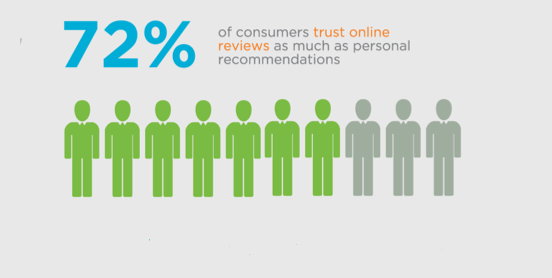There are few things more important to the success of your brand than its reputation. A good reputation can help bring in new customers and increase the loyalty of customers who have already found favor with your company’s goods or services, while a poor reputation can repel possible clients through negative reviews and word-of-mouth warnings.
Even Google, in an effort to make it easy for consumers to get the inside scoop on a business’s reputation, now integrates ratings (aggregated from Google+ reviews) into their search algorithm and rewards “popular” companies (defined by reviews, website traffic, social mentions, and dozens of other criteria) with high search engine rankings. As long as the business keeps pleasing customers, these high rankings results in more traffic, more great reviews, and a better ranking…and the cycle continues.
The Importance Of Reviews
Fifteen years ago, a subpar business in a good location could get by on a steady stream of new customers who saw their storefront and thought, “Sure, I’ll give them a shot!” Even if that business’s products or services were awful, traditional word-of-mouth could only do a small amount of damage to the company’s reputation, and disgruntled patrons had nowhere to go to voice their dissatisfaction—aside from the Better Business Bureau, maybe—to warn other customers.
Today, the Internet has changed all the rules, and the rise of social platforms like Yelp!, Google+, and Facebook means that customers and clients now have access to the opinions of total strangers and an outlet to praise or chastise each company in the palm of their hands. According to recent surveys, somewhere between 75% and 90% of consumers read online reviews when considering patronizing a business, and only a slightly smaller number of people value the advice of strangers on Yelp! just as much as we value the opinions of close friends and family members.

Online Reviews As A Ranking Factor
Remember that old, crummy shop that stayed in business because they had managed to secure a great physical location for their store? Now the most successful businesses are more concerned with their location on Google’s search engine rankings than where their company is actually located on a map—and Google has been slowly increasing the impact on Google+ reviews for years. Though some new SEO experts have placed the importance of reviews at less than 9% in determining a business’ ranking, many digital marketing firms believe that 10 positive reviews provide a ranking boost. On the user side, the inclusion of ratings stars, which show up in Google after you receive 5–6 Google reviews, can’t hurt your brand, either.
Managing Online Reviews
Even the best businesses will likely incur the wrath of a disgruntled patron from time to time, and when this happens, it’s important for brands to have a plan for responding swiftly and effectively. To show customers that you care about their concerns, every negative review should be addressed as soon as possible with a sincere apology and an inquiry about how improvements can be made. Once the customer knows he or she has your attention, offer to give them a free product or a discount on a service as a way to make amends.
Building a customer feedback form into your website is also a great way to keep negative reviews from ruining your business’s reputation on social sites like Yelp! and Google+, though if your reviews are overwhelmingly positive, it’s better to show them off for other customers to see.

Developing a Better Reputation: Beyond Managing Reviews
Doing a little bit of damage control every now and then may be unavoidable for business owners, but even the best internet marketing firm won’t be able to save your reputation if your business doesn’t listen to your patrons’ criticisms and actively work toward making improvements.
As Google’s algorithms move closer and closer to reflecting the opinions and desires of real-life people, it’s getting harder and harder for brands to skate around negative reviews—especially if these reviews start causing their search engine ranking to plummet. In short, if you seem to be earning more than your fair share of unfavorable reviews, maybe it’s time to take a good hard look at your products, services, or the way you interact with customers.
How can you improve your business?



